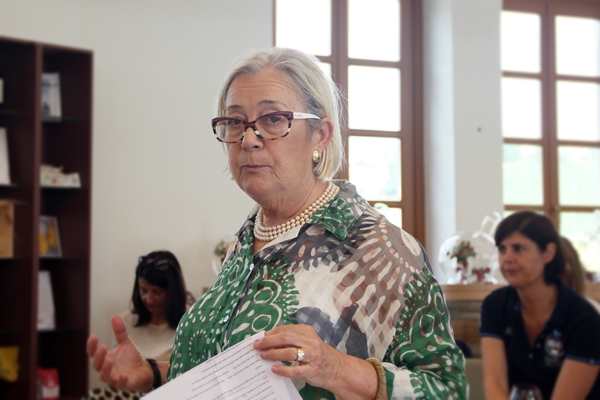Donne del Vino, or Women of Wine, is an Italian nationwide association that networks and provides professional resources for women working in the wine industry. Founded in 1988, this three decades old organisation has become a force to reckon with. With members coming from all areas of the wine industry, it is, without doubt, a very effective professional network. I generally stay away from organisations that champion for certain social groups. In many cases, I saw destructive actions taken against the masses without truly advocating for their members. So when I saw Donne del Vino on my Collisioni itinerary for July, I naturally felt a little uneasy.
The current president of Donne del Vino is Donatella Cinelli Colombini, owner of both Casato Prime Donne and Fattoria del Colle. Silver hair with a tinge of straw yellow, Donatella may look like a regular nonna (grandma). But both her actions and speech carried weight fitting for her stature. For those familiar with Lord of The Rings, she reminded me of Lady Galadriel of Lothlorien. Donatella comes from a wine making family in Tuscany.

In the late 1990s, she ventured on her own path with a family estate and sought help from the Siena oenology school. Unfortunately, she was told there were no men available. But upon leaving specific request for female staff and the school had plenty of options. While people thought that winery’s work is best left for men, it was, in fact, an invisible state of gender inequality. This inspired Donatella to pioneer an estate that runs solely by women, which also gives the name Prime Donne.
Naturally, the tasting session was presented only by women. Some were winemakers, some marketers, and others owners of wineries. They took us through a tasting that involved both the classics and wines from lesser-known indigenous grapes, including Foglia Tonda and Olivella Nera. So I am going to list three of these wines.
The first was a sparkling wine made from 100 per cent Ortrugo grape by Mossi 1558 in Ziano Piacentino, a hilly area on the border of Emilia Romagna and Lombardy. Made using the tank method, the wine showed pear fruit aromas while presenting a tense and slightly chalky sensation on the mouth. The export price is comparable to Prosecco, and its quality certainly deserves attention from importers.
The second notable wine was from a winery in Lazio, Casale della Ioria. An IGT wine from Rosso del Frusinate entirely from Olivella Nera, a unique grape variety growing mostly in Lazio and Casale della Ioria is also the only producer known for a monovarietal wine. A fruity aromatic reminiscent of fresh red berries jam with smoked rosemary spiciness, beautiful flavours on palate complemented with a mouth filling yet velvety sensation.
And even those making well-known wines, they make it with grace. The label on Le Guaite di Noemi Valpolicella Ripasso 2008 reads 16.5 per cent alcohol, a behemoth in a bottle. Instead, the fresh aromas of liquorice and touch of balsamic before ending with a sense of sweet aftertaste. The experience was more like a generous silk caress than a punch delivered with boxing gloves.
So, why these wines? Mainly, if the wine world is open to varieties and new interpretation of the classics, then why isn’t it open to the diversity of people? Today most societies see equality as a given right. And what Donne del Vino achieved is an important step towards embracing diversity and inclusivity. But around the world, inequality goes beyond gender. Colour, religion, language are factors that separate people. We don’t just need Donne del Vino, we need even more organisations that embrace a broader sense of inclusivity for the good of wine industry and our world.



